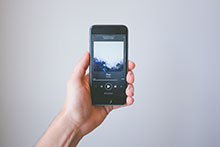It’s Time to Disconnect

March 31, 2019

Chances are your smartphone is within arm’s reach right now, if you’re not already using it to read this. We’re spending more time than ever on our digital devices – did you know the average employee checks 40 websites a day, switching activities 37 times an hour, changing tasks every two minutes? With the flood of incoming texts, emails, calls and push notifications, it’s rare if our screens stay dark for more than a moment.
Our brains were never designed to be constantly connected with others. I know if can be tempting to jump on Pinterest or Houzz for inspiration when we are working on a project and then jump straight into creating mood boards. But as a kitchen and bath specialist, shouldn’t we want to fall in love with the problem first and not the solution?
Schedule Emailing
Consider snoozing your email and app updates in a way that is flexible with your creative work. Also schedule your email communication during reasonable hours that work for you and your contact’s working hours. Your client will greatly appreciate you asking what time of day is best for them to communicate. If you need to compose your email while your thoughts are fresh, scheduling apps can help make staying on task easier.
Device-Free Time
Ending the temptation to check every ding and flash doesn’t require an anguishing separation with your devices. A recent study from the University of British Columbia found that people who focus on their smartphones while sharing a meal with their friends or family had an all-around less enjoyable time. By choosing to be who we are in the present moment (which is the secret to finding happiness), we free up that competitive and anxious space in our brains that gives us more energy to enjoy the people we’re with and our surroundings.
Discussing device-free meals with your clients will show that you care about their quality of life. Suggest specialized storage such as hidden outlets and charging stations in pantries or charging drawers with outlets. If storage space is a premium, adding wireless charging outlets is another solution for putting down those gadgets.
Stop Sleep Procrastination
It is also important to respect your work-life balance. This means putting an end to sleep procrastination. Whether reading trade magazines, playing games or binge watching that popular show, sleep procrastination is when you voluntarily put off hitting the hay even though there’s nothing requiring you to stay awake.
If you cheat the amount of sleep you need, your risk increases for a myriad of health issues such as heart disease, weight gain, stroke, diabetes, Alzheimer’s disease – and you’re more likely to be stressed and depressed, too.
Getting into a bedtime routine won’t automatically make you sleepy, but having rituals can help foster better sleep habits. Try limiting binge-watching to weekend afternoons when you have more free time rather than before bed.
Learn to Love the Dark
Experts advise we power down our devices an hour before bedtime and choose an activity we find relaxing such as listening to music, having a hot beverage, journaling or reading. Take this advice one step further, and leave your phone in another room. The blue light emitted from these devices can make you feel more alert, messing with your body’s internal clock and sleep cycle.
If you use your phone as an alarm clock, STOP IT! Switching to an old-fashioned analog alarm clock (preferably one that is dark until you touch it) will improve your sleep and your mornings. By skipping the scrolling, swiping and refreshing for just 20-30 minutes each morning, you’ll be less distracted, more productive and feel ready to take on the rest of your day in the design world.
More News
April 22, 2024 | Awards & Events, Trends & Inspirations
A Look Inside the 2024 Atlanta Homes & Lifestyles Southeastern Designer Showhouse
April 22, 2024 | KBB Collective
Top Designer Shares Favorite KBIS 2024 Products
April 22, 2024 | Trends & Inspirations
Survey: Nearly Half of Homeowners Invest in Green Plumbing
April 21, 2024 | Business
ADJ Interiors Moves Offices
April 20, 2024 | Business
NKBA Global Connect Adds AMC as Strategic Alliance Partner
April 2, 2024 | Sponsored
Whirlpool Corp. Brings Purposeful Innovation Home